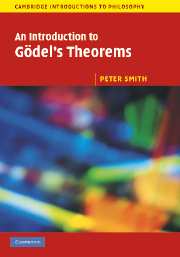Book contents
- Frontmatter
- Contents
- Preface
- 1 What Gödel's Theorems say
- 2 Decidability and enumerability
- 3 Axiomatized formal theories
- 4 Capturing numerical properties
- 5 The truths of arithmetic
- 6 Sufficiently strong arithmetics
- 7 Interlude: Taking stock
- 8 Two formalized arithmetics
- 9 What Q can prove
- 10 First-order Peano Arithmetic
- 11 Primitive recursive functions
- 12 Capturing p.r. functions
- 13 Q is p.r. adequate
- 14 Interlude: A very little about Principia
- 15 The arithmetization of syntax
- 16 PA is incomplete
- 17 Gödel's First Theorem
- 18 Interlude: About the First Theorem
- 19 Strengthening the First Theorem
- 20 The Diagonalization Lemma
- 21 Using the Diagonalization Lemma
- 22 Second-order arithmetics
- 23 Interlude: Incompleteness and Isaacson's conjecture
- 24 Gödel's Second Theorem for PA
- 25 The derivability conditions
- 26 Deriving the derivability conditions
- 27 Reflections
- 28 Interlude: About the Second Theorem
- 29 µ-Recursive functions
- 30 Undecidability and incompleteness
- 31 Turing machines
- 32 Turing machines and recursiveness
- 33 Halting problems
- 34 The Church–Turing Thesis
- 35 Proving the Thesis?
- 36 Looking back
- Further reading
- Bibliography
- Index
18 - Interlude: About the First Theorem
Published online by Cambridge University Press: 05 June 2012
- Frontmatter
- Contents
- Preface
- 1 What Gödel's Theorems say
- 2 Decidability and enumerability
- 3 Axiomatized formal theories
- 4 Capturing numerical properties
- 5 The truths of arithmetic
- 6 Sufficiently strong arithmetics
- 7 Interlude: Taking stock
- 8 Two formalized arithmetics
- 9 What Q can prove
- 10 First-order Peano Arithmetic
- 11 Primitive recursive functions
- 12 Capturing p.r. functions
- 13 Q is p.r. adequate
- 14 Interlude: A very little about Principia
- 15 The arithmetization of syntax
- 16 PA is incomplete
- 17 Gödel's First Theorem
- 18 Interlude: About the First Theorem
- 19 Strengthening the First Theorem
- 20 The Diagonalization Lemma
- 21 Using the Diagonalization Lemma
- 22 Second-order arithmetics
- 23 Interlude: Incompleteness and Isaacson's conjecture
- 24 Gödel's Second Theorem for PA
- 25 The derivability conditions
- 26 Deriving the derivability conditions
- 27 Reflections
- 28 Interlude: About the Second Theorem
- 29 µ-Recursive functions
- 30 Undecidability and incompleteness
- 31 Turing machines
- 32 Turing machines and recursiveness
- 33 Halting problems
- 34 The Church–Turing Thesis
- 35 Proving the Thesis?
- 36 Looking back
- Further reading
- Bibliography
- Index
Summary
We have achieved our first main goal, namely to prove Gödel's First Incompleteness Theorem. And it will do no harm to pause for breath and quickly survey what we've established and how we established it. Equally importantly, we should make it clear what we have not proved. The Theorem attracts serious misunderstandings. We will briefly block a few of these.
What we've proved
To begin with the headlines about what we have proved (we are going to be repeating ourselves, but – let's hope! – in a good way). Suppose we are trying to regiment the truths of basic arithmetic – i.e. the truths expressible in terms of successor, addition, multiplication, and the apparatus of first-order logic. Ideally, we'd like to construct a consistent theory T whose language includes LA and which proves all the truths of LA (and no falsehoods). So we'd like T to be negation complete, at least for sentences of LA. But, given some entirely natural assumptions, there can't be such a negation-complete theory.
The first natural assumption is that T should be set up so that it is effectively decidable whether a putative T-proof really is a well-constructed derivation from T's axioms. So, in short, we want T to be a properly axiomatized theory. Indeed, we surely want more: we want it to be decidable what counts as a T-proof without needing open-ended search procedures (if would be a very odd kind of theory where, e.g., checking whether some wff is an axiom takes an unbounded search).
- Type
- Chapter
- Information
- An Introduction to Gödel's Theorems , pp. 153 - 161Publisher: Cambridge University PressPrint publication year: 2007



